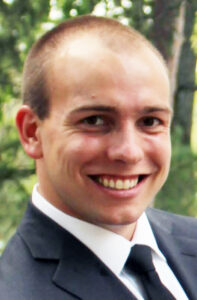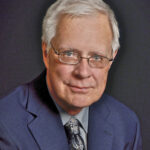By Patrick Schmadeke
Nearly 30 of my fellow early-birds and I were waiting in the public library atrium for the polls to open last Tuesday morning. We were from all walks of life, dressed in scrubs, Carhartts, pajama pants, dress clothes and everything in between.

Shortly after I arrived a man joined us in line and broke the silence of the room, “If everyone else is on their phone, I will, too.” Followed by, “What did we do before phones?” I couldn’t resist temptation and spoke up, “Well, we used to talk to each other.”
The ensuing laughter shattered the dark, cold, stillness of morning. The tensions of life and stress of the elections dissolved into warmth and kinship. Jovial conversation started up about how good it was to see this many people out to vote so early, engaging in their civic responsibility. Eventually the conversation died down, people turned back to their phones and the room returned to silence.
Perhaps the most important way that conversation, or language, functions is the creation of solidarity. Language is an attempt at self-communication, at sharing one’s interior life with another, rendering oneself vulnerable to the hearer.
God gives us an example of how to share our interior life through the incarnation. The Word of God came to meet us, and calls us “friends”
(Jn 15:15). To love a friend, Jesus tells us a few verses earlier, means “laying down one’s life” (Jn 15:13). Thus, dialogue can become a holy, even sacramental activity.
This matter is particularly relevant in the course I teach on the Common Good at Holy Cross College. This week my students have been tasked with discussing abortion and the death penalty.
The exercise is designed to require half of the students to articulate a position in favor of abortion while the other half articulates a pro-life position. Later, we will do the same exercise on the death penalty.
These students know the position of the church, which is pro-life on both matters. That’s not the point. The point is to practice our capacity to communicate well. In everyday life this has almost nothing to do with proving other people wrong. Sacramental communication has everything to do with engendering an encounter with the living God in the heart of one’s conversation-partner.
My students, 18- and 19-year-olds, are well practiced at the art of communication. The challenge for those who will argue from a pro-life perspective is to speak as if they are talking to someone who has had an abortion, and is deeply grateful for the “career-saving procedure.” For those who argue from a pro-abortion perspective, their challenge will be to speak as if they are talking to a person who has had an abortion and now feels uncertainty about their decision. As both sides speak with tenderness in the language of accompaniment, their challenge is to speak meaningfully to one another at the level of the heart.
Sacramental communication calls us to be tender with one another, not because we don’t know where we stand as Catholics, but because we DO know where we stand. We stand on the side of the dignity of all life, including the life of those with whom we vehemently disagree, because they, too, are beloved children of God.
Thinking back to the group of us ready to cast our ballots on the morning of the elections, surely there would have been disagreement among us had political opinions been expressed. I suspect that our disagreement would have been situated in the spirit of solidarity that had formed among us.
Engaging in good conversation is difficult, but I’m not sure we have any other option. We are called to something more than mere disagreement. We are called to see God in one another, the God in whose image and likeness we are all created. Then and only then will we find ourselves partaking in communication of a holy and sacramental quality. God wants us to settle for nothing less.
(Editor’s note: Patrick Schmadeke is a graduate of St. Ambrose University (‘13) and a student in the Master of Divinity program at the University of Notre Dame. His column offers reflections on his coursework, engaging with the richness of the Catholic Tradition and its relevance to the world today.)











